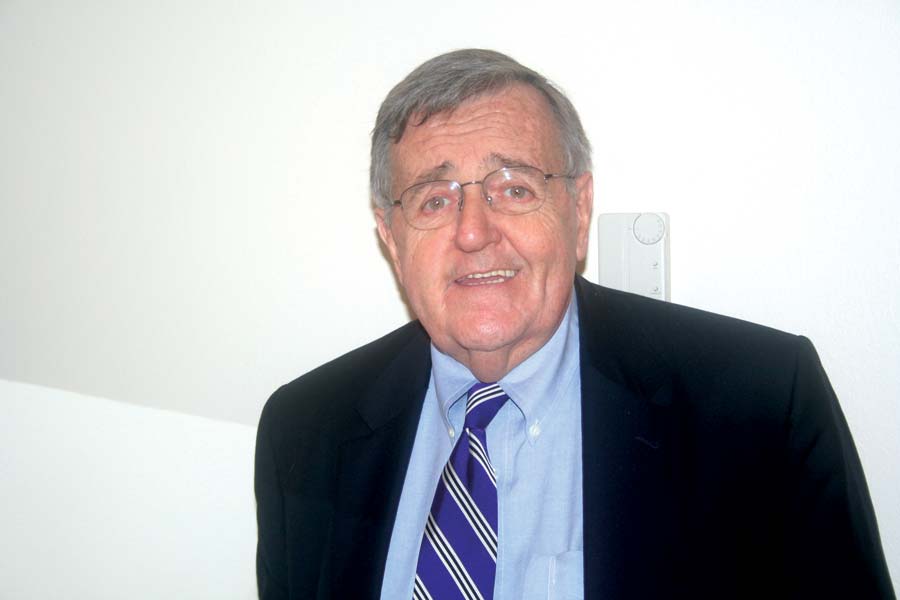
American politics today is rife with polarization between conservatives and liberals, according to political analyst Mark Shields.
The contributor to the Washington Post, CNN and PBS spoke to the MSU community Tuesday night on the state of political discourse in the United States.
“There is more political polarization than at any time since I have been in Washington,” said Shields, who has covered nine presidents in his 45-year journalistic career.
Two factors have contributed to this shift toward party politics.
One is congressional redistricting, which affects how the congressional lines are drawn, he pointed out in an exclusive interview with The Wichitan.
“The lines are drawn in a partisan fashion,” Shields said. “So if it’s a Democratic state legislature and a Democratic governor in the state, they’re going to draw the lines so that they benefit Democrats. And vice-versa. Republicans, of whom there are more in control, draw the lines in favor of Republicans.”
This way, candidates up for election don’t have to worry about doing well in the November general election, Shields said. Instead, they have to be concerned only about the primary elections.
“You have to worry that someone’s going to challenge you for not being sufficiently orthodox, sufficiently zealous in your commitment to the cause, ” Shields said.
This discourages what Shields called “working across the aisle,” which he summed up as politicians finding solutions to problems regardless of their political affiliation. In the current political climate, a Democrat, for example, who supports a Republican’s idea, may draw criticism from his/her fellow party members.
“What we saw in 2010 is the Tea Party challengers not only mounted challenges, but they were successful against Republican candidates for the Senate in Nevada, Colorado, Alaska, Delaware, Kentucky,” he said. “And the pattern was the same in each one of them. The person who was running had been too friendly to the other side. They worked across the aisle in a bipartisan fashion.”
The second factor contributing to the growing trend of political polarization is where the representatives live.
If Shields had his way, representatives would all live in Washington, D.C. They would also meet for three or four consecutive weeks, Monday through Friday. Currently representatives meet in the nation’s capitol on Tuesday and leave Thursday.
If representatives all lived in the same place, they would be nicer to one another and see each other as real people, Shields argued.
“If you’re a Republican and I’m a Democrat, and your kids go to school with my kids, or they play in the same little league, I get to know you as a person,” he said. “Right now, they don’t know each other. It makes it easier for me to demonize you, to caricaturize you.”
He said there was a time when politicians knew one another better and practiced a higher level of civility.
“I’m not saying that’s the cure-all,” he said. “But I do think that would help enormously.”
Some politicians don’t try to reach across the aisle because they fear they won’t be reelected if they do.
“When that becomes an overwhelming obsession, that you’re terrified of being challenged in the primaries, all of a sudden you’re looking over your shoulder,” he said.
Shields said the biggest trend he has seen during his career in journalism is the explosion of information available to the general public. He laments, however, the decline of the daily newspaper.
“The daily newspaper, which I do out of conviction and habit read every day, is something that forces me to become a citizen outside of my comfort zone,” Shields said. “It forces me to read about what’s going on in Greece, or that Texas went through this heat wave this summer, even though I’m thousands of miles away.”
He said he has also seen the polarization of broadcast news is recent years. When he began working at CNN, not much competition from other stations existed. Now it seems that each station caters to a particular viewer demographic.
“If you’re a liberal viewer you go to MSNBC, if you’re a conservative you go to FOX,” Shields said. “It’s polarized. Viewers go not so much for information as they do for ammunition. What’s Sean Hannity going to tell me? What’s my argument? Tell me, Rachel Maddow, what’s the three points I should make in rebutting? That to me is a major change. It does influence the public debate.”
“This election of 2012 is going to be very influential,” he said. “The rule of American elections is that when the economy’s bad, the economy is the only issue.”
He said the Civil Rights movement of the 1960s was bolstered by a booming economy. The Gross National Product of the United States was doubling during this time.
“So if the economy is good, I am naturally more generous,” he said. “I’m more inclusive. I’m more willing to give a helping hand. Even though it meant the African-Americans were going to get jobs they hadn’t had, I didn’t feel threatened that my sister, brother or child was going to suffer.”
The decade of 2001 to 2011, by contrast, has been straddled by economic shortcomings.
“That makes me more self-absorbed, more self-concerned, less generous,” Shields said. “The tragedy of our nation’s dealing with immigration is how our economy has accelerated our natural selfishness and hostility. We’ve got to figure out how we deal with this and come to a national consensus on it.”














